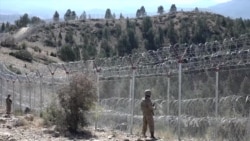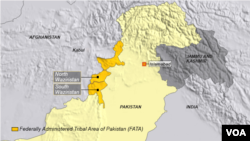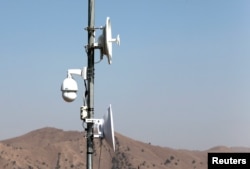Pakistan’s military is installing a robust fence along its largely porous 2,600-kilometer border with Afghanistan and establishing new forts as well as outposts on mountain peaks.
Officials hope the fortification plan of hundreds of millions of dollars will effectively prevent militant infiltration and stabilize both sides of what has been traditionally an open border with numerous regular and irregular crossings.
Afghanistan opposes the fence project. It has traditionally disputed the colonial-era demarcation drawn up by the British in 1893 and does not recognize it as an international boundary. Kabul maintains the fence plan would add to the problems of divided families and tribes, mainly ethnic Pashtuns, straddling the dividing line.
Islamabad dismisses Afghan objections over the status of the boundary and insists it inherited the international frontier when Pakistan gained independence from Britain in 1947.
On Wednesday, the Pakistan army flew reporters to the tribal border regions of South Waziristan and adjoining North Waziristan, which together share a more than 300-kilometer border with Afghanistan.
The two semi-autonomous tribal districts are part of the volatile Federal Administered Tribal Areas, known as FATA, and were until a few years ago notorious for harboring militants blamed for terrorist attacks on both sides of the Pakistan-Afghanistan border.
Pakistani commanders say security operations have neutralized the threat of militancy in almost all of FATA, prompting authorities to launch the construction of a pair of 12-feet high chicken wire fences topped with barbed wire.
The fence is a “paradigm change” and an “epoch shift” in the border control management, said local army commander, Major-General Nauman Zakaria while briefing reporters at a newly built fort on in Angoor Adda, which overlooks Afghan district of Barmal.
“I have a border of about 106 kilometers that this [South Waziristan] agency shares with Afghanistan,”… [which] is going to be completely fenced, and the border forts will be completed. There will not be an inch of international border [here] which shall not remain under our observation by December of 2018,” said Zakaria.
He noted while Pakistani troops occupy over 150 outposts in the area under his command, Afghan forces maintain only 21 posts on their side due to capacity issues and lack of sufficient forces.
“We are sitting here to stay now, inshallah [God willing]. So, while we do this for our sakes, we complement our Afghan brothers and we complement their capacity issues, so that they are also very sure that there is no place left unguarded on the Pakistan and Afghanistan border,” said the general.
High-tech surveillance
Modern surveillance systems, including drones, are also being deployed to ensure day-and-night monitoring of the border.
The fencing plan, expected to be fully implemented within the next two years, will cost Pakistan an estimated cost of $532 million. Around 180 of the 750 forts the army plans to build along the border have been either completed or are under construction.
Military officials say they have thus far fenced off more than 40 kilometers of what is considered as most critical and vulnerable to militant infiltration.
Strict border controls have been introduced at the two main border crossings of Torkham and Chaman to document identities of daily crossers.
Area military commanders admit the fencing plane will divide villagers around Chaman but say the government plans to relocate Pakistani families by offering them financial compensations.
But despite Pakistan’s border security measures, the country remains under scrutiny amid persistent Afghan and U.S. allegations that Islamabad is covertly helping the Taliban and its ally, the Haqqani terrorist network, to use safe havens on Pakistani soil for plotting attacks against the Afghan government.
Pakistan rejects charges
Afghan officials allege insurgent leaders are located on the other side of the border and are being protected by the Pakistani spy agency.
Islamabad strongly rejects the charges and says sustained security operations have cleared all areas of militants on its side of the border. In turn, Pakistan alleges militants have taken refuge in ungoverned Afghan areas and plot cross-border deadly raids.
Speaking in Angoor Adda, General Zakaria vowed that by the time the border management plan is completed “we will be very sure of one thing: that nobody can cross this place." He said the fence will address mutual concerns "once forever" and help Pakistan maintain a stable relationship with the neighbors he described as "Afghan brothers."








